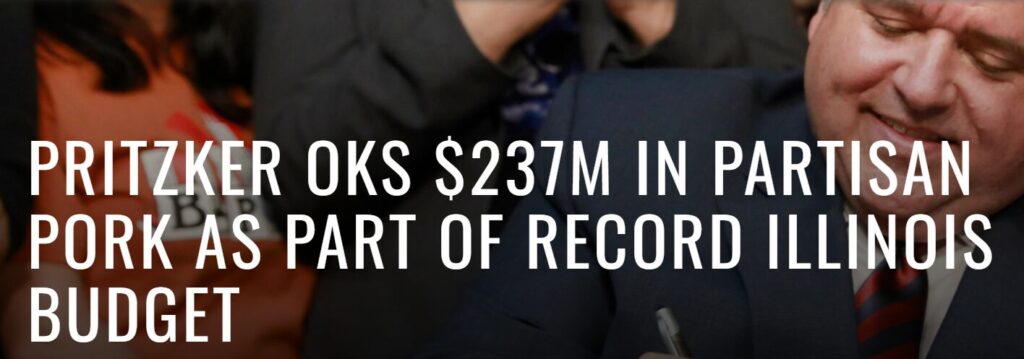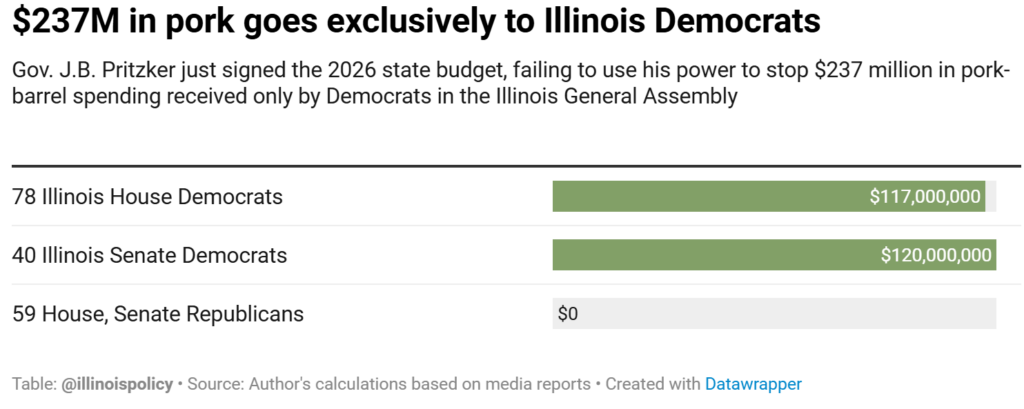From the Illinois Police Institute:

Gov. J.B. Pritzker had the power to strike $237 million in pork-barrel projects that benefit only Democratic lawmakers’ districts. He should have vetoed the pork projects to create a responsible state budget that is fair to all Illinois taxpayers.
Pet projects have no place in a bloated budget, and yet Democrats have been given $237 million in taxes for their districts that Republicans did not receive.
Illinois Senate Democrats reportedly received $3 million each. Illinois House Democrats got $1.5 million each. Republicans got nothing.

At $55.2 billion in general funds spending, the governor just signed the biggest budget in state history.
The fiscal year 2026 budget is up $2 billion from last year and propped up by more than $1.55 billion in revenue that was projected but other forecasts said was iffy.
Buried in its 3,300-plus pages are hundreds of local “member-initiative” earmarks that benefit only Democratic districts.
That means 4.3 million Illinoisans, or 1 in 3, was excluded from the pork projects their taxes supported in other legislative districts.
This isn’t the first time blatantly partisan spending has been included in the budget.
An investigative report in 2022 found a total of $368 million for House Democrats and $326 million for Senate Democrats.
None was included for Republicans.
While individual Democratic legislators are primarily focused on projects for their own districts, the governor is elected to serve all of Illinois.
Just as Gov. J.B. Pritzker promised to veto any “broad-based” tax increase, he should have also used his veto powers to strike the Democrat-only district projects from the budget.
The governor has the power to veto specific sections of an appropriations bill that he disagrees with, called an “item veto.”
The rest of the appropriations would have become law unless the General Assembly overrode the veto with a three-fifths vote in both chambers.
In practice, a surgical line-item veto allows the chief executive to keep the core budget intact –
- schools,
- public safety,
- human services –
while removing parochial pork.
Recent governors have used this power sparingly.
Pritzker could have changed that. In fact, he used his reduction veto to make minor corrections, showing he reviewed the budget and was willing to use the veto powers, but unwilling to apply them to this partisan project spending.
Removing the member initiative spending from the budget would have allowed for more responsible use of that money to benefit the whole state of Illinois.
The extra money could have gone toward replenishing the state’s rainy-day fund, which at 28 days’ worth of spending is the lowest in the nation.
It could also have been used to fight the state’s growing pension debt.
The budget may be balanced on paper, but it’s certainly not balanced for the districts that miss out on funds based on the political party of their lawmakers.
Making good on his promise to govern for “all of Illinois” will require Pritzker to set a higher standard in budgets to come, striking district-only earmarks and insisting on fair, transparent investments of taxpayers’ money.
